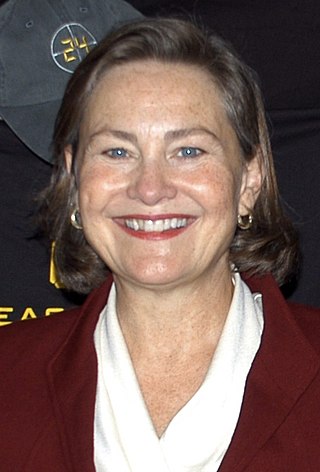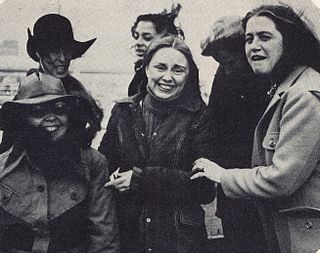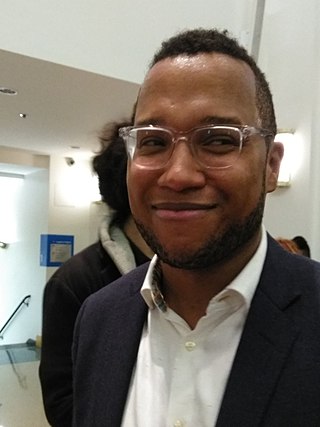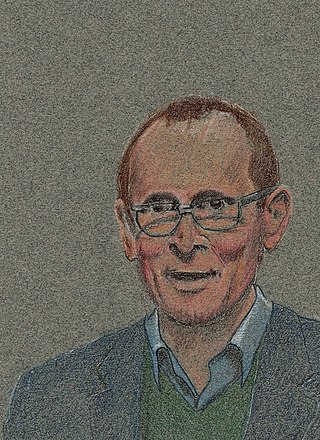Related Research Articles
Charles Louis Mee Jr. is an American playwright, historian and author known for his collage-like style of playwriting, which makes use of radical reconstructions of found texts. He is also a Special Lecturer of theater at Columbia University.

Henrietta Vinton Davis was an elocutionist, dramatist, and impersonator. In addition to being "the premier actress of all nineteenth-century black performers on the dramatic stage", Davis was proclaimed by Marcus Garvey to be the "greatest woman of the Negro race today".

Cherry Jones is an American actress. She started her career in theater as a founding member of the American Repertory Theater in 1980 before transitioning into film and television. Celebrated for her dynamic roles on stage and screen, she has received various accolades, including three Primetime Emmy Awards and two Tony Awards, as well as nominations for an Olivier Award and a Screen Actors Guild Award.

Mary G. Shaw was an American actress, playwright, suffragist, and early feminist.
Roberta Sklar is an American activist, feminist and award-winning theatre director. She is currently a communications consultant and senior strategist for OutRight Action International and other LGBT Rights advocacy organizations. She formerly served as Director of Communications for The International Gay and Lesbian Human Rights Commission, The National Gay and Lesbian Task Force and the Empire State Pride Agenda. Sklar has provided strategic communications consulting to social justice domestic and international organizations.

Lydia Thompson, was an English dancer, comedian, actor and theatrical producer.
Myrna Lila Lamb was an American playwright.

Rosemary Anne Sisson was an English television dramatist and novelist. She was described by playwright Simon Farquhar in 2014 as being "one of television's finest period storytellers", and in 2017 fellow dramatist Ian Curteis referred to her as "the Miss Marple of British playwriting".
Helen Krich Chinoy was an American theater historian who documented the role of women in United States theater.
Lizbeth Goodman FRSA is Professor of Inclusive Design for Education at University College Dublin, and a professor in the university's School of Mechanical and Materials Engineering.

The Westbeth Playwrights Feminist Collective was a group of professional women playwrights in New York active from 1971 to 1975. They wrote and produced feminist plays and were one of the first feminist theatre groups in the United States to do so. The members' individual works had been produced at the Public Theater, La Mama, Joe Chaikin’s Open Theater, Caffe Cino, Circle Repertory Company, Mark Taper Forum, Lincoln Center, and New York Theater Ensemble.
Bonnie Marranca is a New York City-based critic and publisher and the editor of PAJ: A Journal of Performance and Art, which she co-founded in 1976. She has written several collections of criticism, including Performance Histories (2008), Ecologies of Theatre (2012), and Timelines (2021). Her 1984 book Theatrewritings received the George Jean Nathan Award for Dramatic Criticism. Marranca has edited numerous anthologies of dramatic texts and criticism including New Europe: Plays from the Continent (2009), Plays for the End of the Century (1996), The Hudson Valley Reader (1995), and American Dreams: The Imagination of Sam Shepard (1981), in addition to The Theatre of Images (1977), a seminal collection featuring Robert Wilson, Lee Breuer, and Richard Foreman—early exponents of what was later termed postdramatic theatre. Published collections of her interviews include Conversations with Meredith Monk (2014) and Conversations on Art and Performance (1999). Marranca's essays have been translated into over twenty languages.
Alvina Krause was an American drama teacher at Northwestern University, theatrical entrepreneur, "maker of stars", and director. Her students called her AK. Her first name is pronounced Al-vine-na
Sheri Wilner is an American playwright.

Branden Jacobs-Jenkins is an American playwright. His plays Gloria and Everybody were finalists for the 2016 and 2018 Pulitzer Prize for Drama. His play Appropriate made his Broadway debut as a playwright in 2023 and earned him his first Tony Award. His additional plays include An Octoroon and The Comeuppance. He was named a MacArthur Fellow in 2016.

Agnes B. Morgan was a director, playwright, actress and theatrical producer. She is most known for her association with the Neighborhood Playhouse where she was a director and functioned in numerous other roles.

Timothy Peter Mason was an American playwright. He wrote a number of plays, including Levitation, Only You, Babylon Gardens, The Fiery Furnace and Bearclaw. He also wrote the novels The Last Synapsid,The Darwin Affair,The Nightingale Affair, and the book and lyrics for the Broadway musical, Dr. Seuss' How the Grinch Stole Christmas!
Martha Boesing is an American theater director and playwright. She was the founding artistic director of the Minneapolis experimental feminist theater collective At the Foot of the Mountain.

The Women's Interart Center was a New York City-based multidisciplinary arts organization conceived as an artists' collective in 1969 and formally delineated in 1970 under the auspices of Women Artists in Revolution (WAR) and Feminists in the Arts. In 1971, it found a permanent home on Manhattan's far West Side.
John Waldhorn Gassner was a Hungarian-born American theatre historian, critic, educator, and anthologist.
References
- 1 2 3 About Me, Linda Walsh Jenkins personal website (accessed 12 October 2022)
- ↑ Jenkins, Linda Walsh, Library of Congress (accessed 12 October 2022)
- 1 2 3 Linda Walsh Jenkins papers, Smith College Libraries (accessed October 12, 2022)
- ↑ Maes, Nancy (23 May 1986). "TO WRITE IT DOWN RIGHT, THE PLAYWRIGHT CAN LEARN FROM HEARING". Chicago Tribune. Retrieved 2021-01-12.
- 1 2 3 Terry McCabe (2018). The 90-Day Play: The Process and Principles of Playwriting Linda Walsh Jenkins. New England Theatre Journal 29: 158–59
- ↑ Douglas Post (August 10, 2021). Remembering Sally Nemeth. Chicago Reader (accessed October 12, 2022)
- ↑ Annie-Sage Whitehurst (2009). Linda Walsh Jenkins Papers, 1975-1987 (accessed October 12, 2022)
- ↑ Haugo, Ann. "American Indian theatre" in The Cambridge Companion to Native American Literature (Porter, Joy, Roemer, Kenneth M., eds), pp. 189–204 (Cambridge University Press; 2005) doi : 10.1017/CCOL0521822831.010 ISBN 978-0-521-82283-1
- ↑ Marvin A. Carlson. Theories of the Theatre: A Historical and Critical Survey, from the Greeks to the Present, p. 532 (Cornell University Press; 2018) ISBN 9781501726880
- ↑ Rosemary Malague. An Actress Prepares: Women and "the Method", pp. 1–2 (Routledge; 2013) ISBN 9781136503900
- ↑ Lesley Ferris (2014). An Actress Prepares: Women and "The Method" by Rosemary Malague. Theatre Journal 66 (2):310–11 doi : 10.1353/tj.2014.0049
- 1 2 3 Karen Laughlin (1989). Women in American Theatre ed. by Helen Krich Chinoy, Linda Walsh Jenkins, and: Interviews With Contemporary Women Playwrights ed. by Kathleen Betsko, Rachel Koenig (review). Modern Drama 32 (1): 163–67 Project Muse
- 1 2 3 Heather McMahon (2007). Women Writing Plays: Three Decades of the Susan Smith Blackburn Prize, and: Women in American Theatre: Revised and Expanded Third Edition (review). Theatre Topics 17 (1): 88–89 doi : 10.1353/tt.2007.0009
- ↑ Weber, Bruce. "Helen Chinoy, A Historian of Theater, Dies at 87", The New York Times , June 13, 2010. Accessed March 27, 2018.
- ↑ Luddy, Thomas E. (February 1981). "Women in American Theatre (Book)" . Library Journal. 106 (3): 367 – via EBSCOhost.
- ↑ Judith E. Barlow (1982). Helen Krich Chinoy and Linda Walsh Jenkins, eds., Women in American Theatre. New York: Crown Publishers, 1981. xi + 370 pp. + 32 pp. of photographs. $19.95. Theatre Survey 23 (2): 253–56 doi:10.1017/S0040557400008127
- 1 2 Bonnie Marranca (1981). Women In American Theatre ed. by Helen Krich Chinoy and Linda Walsh Jenkins. Performing Arts Journal 5 (3): 105–06
- ↑ Jill Dolan (1990). Women in American Theatre. Helen Krich Chinoy, Linda Walsh Jenkins Interviews with Contemporary Women Playwrights. Kathleen Betsko, Rachel Koenig Feminism and Theatre. Sue-Ellen Case. Signs: Journal of Women in Culture and Society 15 (4): 864–69 doi:10.1086/494636
- ↑ Dover, Bessie (1982-07-11). "Women in Theatre". The Daily Spectrum. p. 85. Retrieved 2021-01-12– via Newspapers.com.
- ↑ Editors (1988). Editors' Choice: Books We Recommend. TDR 32 (2): 21–24 JSTOR 1145848
- 1 2 3 Gross, Sarah Chokla (September 15, 1975). "'The Cookie Jar' and Other Plays/Five Plays from the Children's Theatre Company of Minneapolis" . Library Journal. 100 (16): 1648–1649 – via EBSCOhost.
- ↑ Per text and note a